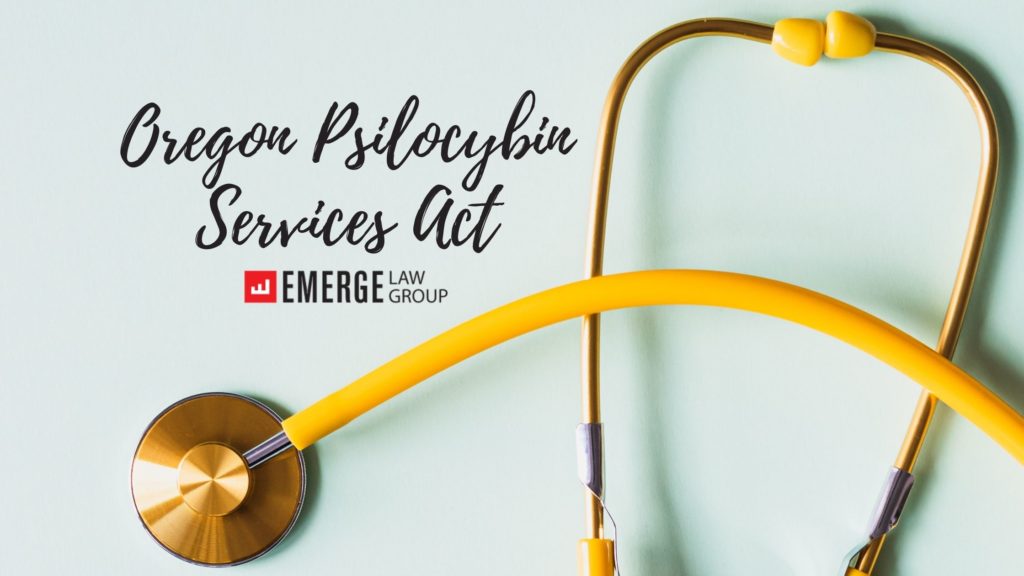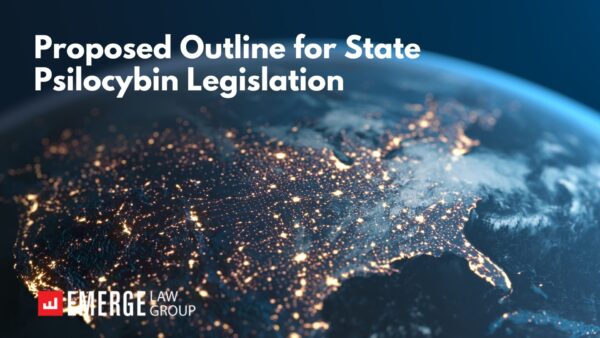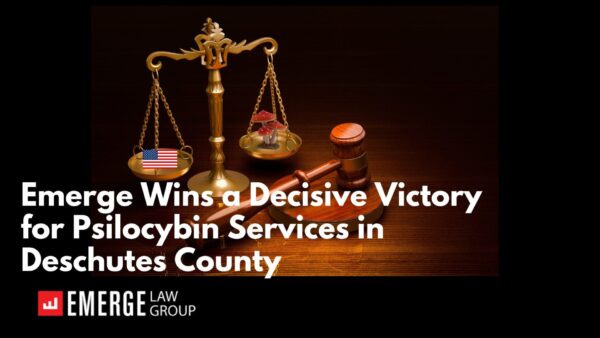There seems to be a fair amount of confusion out there as to whether the Oregon Psilocybin Services Act (the “Act”) is medical or non-medical in nature.
A recent STAT article dove into the issue of precisely how to characterize the nature of psilocybin services under the Act. Here are a few quotes from several of the folks that the author interviewed:
- “Oregon very much is going to allow for diagnosis and treatment”
- “[Oregon] did craft the measure in such a way where depression, PTSD, addiction are things that will be supported here”
- “People will want mental health treatment but it’s not medical”
- “This is not medical . . .But this is psilocybin-assisted therapy”
- “Psilocybin facilitation . . .I mean, nobody knows what that is”
The members of the Oregon Psilocybin Advisory Board (“PAB”) themselves are all over the map on this issue, as are several of the PAB subcommittees. The Oregon Health Authority (“OHA”) has been participating in the numerous PAB meetings and PAB subcommittee meetings that have taken place over the last year. However, the OHA has taken a rather passive approach when it comes to keeping PAB members focused and within the boundaries of the Act. For the most part, the OHA appears to have adopted a policy of “let’s just let them talk.”
I’m sure there are valid reasons for this, but I think opportunities have been lost over the past year as the PAB and the various subcommittees have, on more than a few occasions, gone off on tangents that either have nothing to do with the Act, are inconsistent with the Act, or show a fundamental misunderstanding of the Act.
As a result, the PAB has so far failed to make any final recommendations on what I would have thought from Day One were the handful of really important things that should have been at or near the top of everyone’s list, namely: (1) what are the components of a preparation session, an administration session, and an integration session; (2) what are the contents of the client information form (which is the form that a client must complete before participating in an administration session); (3) what is the facilitator supposed to do with the information provided on the client information form; and (4) what, precisely, is the scope of practice of a facilitator.
To be clear, that’s not to say that there hasn’t been a lot of discussion about these issues. It’s only to say that the discussions are occurring pretty late in the game and have become confusing and sprawling in nature.
Hence the confusion.
Back to the question at hand though: What exactly are psilocybin services under the Act?
Let’s start off by reviewing a few definitions. Here are the most relevant ones for our purposes:
- “Psilocybin service facilitator” means an individual that facilitates the provision of psilocybin services in this state.
- “Client” means an individual that is provided psilocybin services in this state.
- “Psilocybin services” means services provided to a client before, during, and after the client’s consumption of a psilocybin product, including: (a) a preparation session; (b) an administration session; and (c) an integration session.
- “Preparation session” means a meeting between a client and a psilocybin service facilitator that must occur before the client participates in an administration session.
- “Administration session” means a session held at a psilocybin service center at which a client purchases, consumes, and experiences the effects of a psilocybin product under the supervision of a psilocybin service facilitator.
- “Integration session” means a meeting between a client and a psilocybin service facilitator that may occur after the client completes an administration session.
Admittedly, some of those definitions are broad and open-ended in nature, and they need to be fleshed out by the OHA in the final rules.
However, there is another very important provision of the Act which must shape the OHA’s final rules. Section 30(3) of the Act states that the OHA may not require a facilitator to have a degree from a university, college, post-secondary institution, or other institution of higher education. A facilitator must: (i) have a high school diploma or equivalent education; and (ii) complete an education and training program prescribed and approved by the OHA. But that’s it. No further education or training is required.
With that statutory prohibition in place, it would be unlawful for the OHA to promulgate rules that would require a facilitator to engage in the practice of some other licensed profession that, itself, would require a degree from an institution of higher learning.
Example: An individual cannot practice psychology in Oregon without being licensed by the Oregon Board of Psychology. And an individual cannot be licensed by the Oregon Board of Psychology without holding a degree from an institution of higher education. Fair enough. Now, what constitutes the practice of psychology? A statutory definition provides the answer. ORS 675.010(4) states in relevant part:
“Practice of psychology” means rendering or offering to render supervision, consultation, evaluation or therapy services to individuals, groups or organizations for the purpose of diagnosing or treating behavioral, emotional or mental disorders. [Emphasis added.]
Consequently, the OHA cannot promulgate rules under the Act that would require a facilitator to diagnose or treat a client’s behavioral, emotional, or mental disorder. To do so would be tantamount to requiring that every facilitator be a licensed psychologist, which in turn is tantamount to requiring that every facilitator hold a degree from an institution of higher learning.
The same analysis must take place for the practice of medicine (defined in ORS 677.085), the practice of naturopathic medicine (defined in ORS 685.010(4)), the practice of occupational therapy (defined in ORS 675.210(3)), and the practice of any other licensed profession that requires a degree from an institution of higher learning.
Back to our question: What exactly are psilocybin services under the Act? Well, after we strip away the components of every other conceivably relevant licensed professional practice, what are we left with? Once again, the answer is in the definitions section of the Act, and it boils down to something quite simple and limited.
Recall the following from the definitions:
- A “psilocybin service facilitator” facilitates the provision of psilocybin services.
- “Psilocybin services” includes a preparation session, an administration session, and an integration session.
- An “administration session” is a session at which a client purchases, consumes, and experiences the effects of a psilocybin product.
Given the above, I would phrase the answer to the question as follows: Psilocybin services under the Act means the facilitation and supervision of a client’s psilocybin experience. That’s it. No required diagnoses. No required treatments. No required therapy. No required attempts to cure anything.
This is consistent with one of the other most important provisions of the Act: Section 8(4) of the Act states that the OHA may not require a client to be diagnosed with or have any particular medical condition as a condition to being provided psilocybin services. This means that any client who is otherwise eligible can purchase and consume a psilocybin product under the Act for any reason, or for no particular reason at all. Medical or mental health conditions may have something (or everything) to do with a client’s decision to seek out psilocybin services, but that won’t necessarily be the case (and it may not even be the case a majority of the time).
This fact illustrates the non-medical nature of the Act.
But we shouldn’t stop there.
Is the Act anti-medical in nature? By that, I mean does the Act prohibit a facilitator who also holds some other professional license from practicing that other profession while at the same time providing psilocybin services to a client? The answer is no, there is no such prohibition in the Act.
As an example, there is nothing in the Act that prevents an individual who holds both a facilitator license and a license to practice psychology from practicing psychology during a preparation session, an administration session, or an integration session.
Now, it is conceivable that the OHA could promulgate rules under the Act that outright prohibit this combining of licensed professions, but I doubt they will do that. Similarly, it is possible that the Oregon Board of Psychology could prohibit licensed psychologists from practicing psychology in conjunction with providing psilocybin services. But that would be up to the Oregon Board of Psychology. And the same would go for any other conceivably relevant licensed profession and the board that regulates that profession.
The important thing to appreciate is that, from a rulemaking perspective under the Act, the OHA should focus only on those “bare bones facilitators” who hold a facilitator license and nothing else. Detailed rules and ethical guidelines are already in place for all other licensed professions, and the OHA should let the boards of those professions grapple with the combination of those professions with the provision of psilocybin services. The OHA’s rules for facilitators under the Act: (i) should only focus on what a facilitator needs to do to safely facilitate and supervise a client’s experience; (ii) should assume that all facilitators are bare bones facilitators who are neither qualified nor legally permitted to practice another licensed profession; and (iii) should not require any facilitators to practice any other licensed profession.
To date, there have been many recommendations from various PAB subcommittees that don’t seem to understand the OHA’s statutory restrictions on this matter. These recommendations have rightly led some to say that the PAB has been “over-medicalizing” the Act.
For example, certain PAB subcommittee members have suggested that: (i) the client information form should contain numerous open-ended questions about the client’s entire medical history, mental history, trauma history (including childhood trauma), substance abuse history, and the like; (ii) based on the client’s responses, the facilitator should make a discretionary determination as to the client’s eligibility to participate in an administration session; and (iii) if the facilitator determines that the client is eligible, the facilitator should develop a tailored safety plan based on the client’s responses. I suppose folks can disagree on this, but I don’t see how a bare bones facilitator would be qualified to do this in the first place, or how a bare bones facilitator would be able to do this without crossing the line and practicing some other licensed profession.
If an individual who is both a licensed facilitator and a licensed psychologist wants to ask a client 101 different open-ended questions about the client’s psychological history and then do something with that information during the provision of psilocybin services, and if all of that is just fine with the Oregon Board of Psychology, then the facilitator/psychologist should be free to do. But the OHA cannot require the same of every facilitator.
Again, the Act is non-medical, but not anti-medical. At its base level, the Act is not medical. But in the hands of appropriately licensed medical professionals, the Act can be medical, at least in the sense that basic psilocybin services can be combined with other licensed medical and mental health services.
Overall, the Act is an extremely unique and innovative thing. But this part of it shouldn’t be that confusing. It’s all a question of scope of practice. The Act has created a brand-new type of licensed professional called a psilocybin service facilitator. This new profession has a relatively limited, narrow, and non-medical scope of practice, at least when the profession is being practiced in its pure stand-alone form, and not in combination with some other licensed profession.




